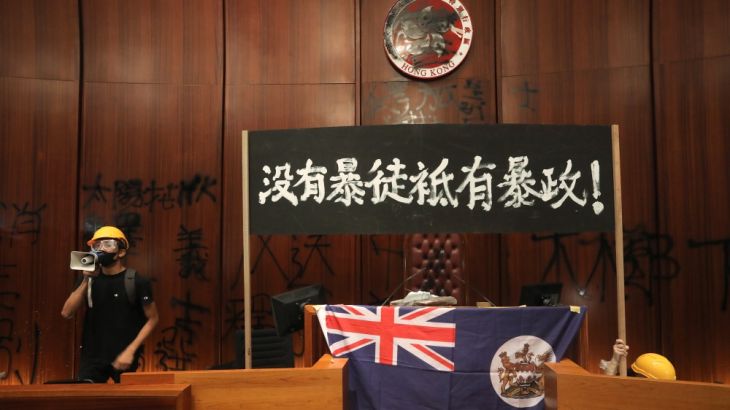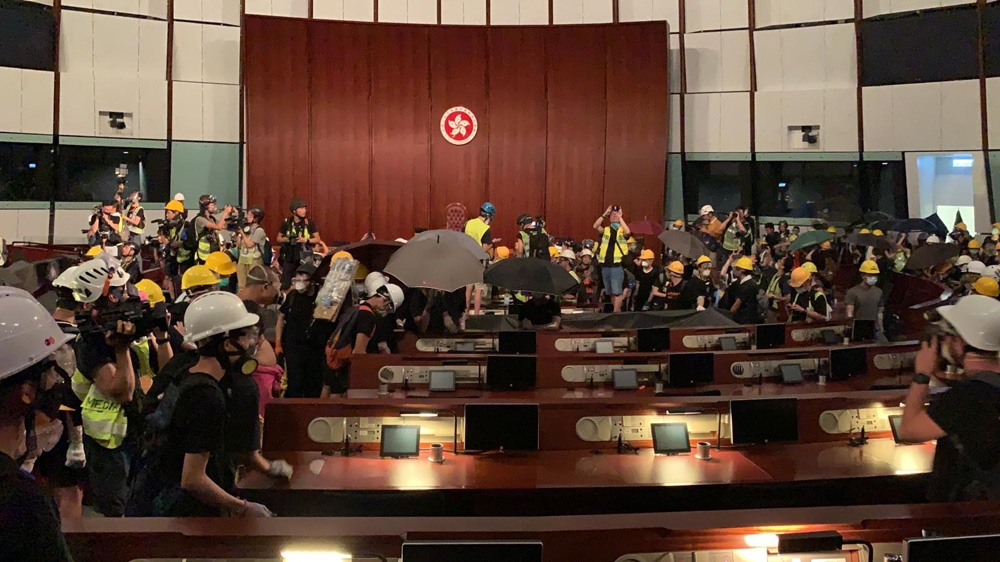Hong Kong protesters storm legislature, smash doors and walls
Hong Kong police fired tear gas to evict anti-government protesters who had stormed and ransacked parliament.

Police in Hong Kong have fired tear gas to clear the Legislative Council building hours after protesters had stormed and vandalised the parliament in unprecedented scenes, as the city leader condemned the violence.
Police restored control early on Tuesday after street clashes with protesters at the end of a day of unrest.
Keep reading
list of 4 itemsThe Take: Where are Hong Kong’s protesters now?
Hong Kong’s new security law comes into force amid human rights concerns
Hong Kong passes tough new national security law
Hong Kong’s embattled leader Carrie Lam said police exercised restraint in dealing with the latest wave of protests to rock the city. She condemned the “extremely violent” scenes at the legislature in an early morning press conference.
Demonstrators in their hundreds overran the Chinese territory’s legislature late on Monday, smashing walls, spray-painting graffiti, and taking over the chamber as the weeks-long crisis over a controversial extradition bill came to a head.
Police carrying riot shields and batons and firing tear gas moved in shortly after midnight to clear surrounding streets. Plumes of smoke billowed across major thoroughfares and in between some of the world’s tallest skyscrapers.
|
|
The authorities earlier warned demonstrators to clear the building immediately, calling the occupation “illegal” and saying they would deploy “appropriate force” if the protesters remained inside.
The extraordinary scenes came on the anniversary of the semi-autonomous territory’s return from British control to mainland China 22 years ago.
Riot police apparently retreated as hundreds of demonstrators streamed into the building after a small group of mostly students wearing hard hats and masks used a metal trolley, poles and scaffolding to batter the compound’s reinforced glass doors until it gave way.
Once inside, protesters ripped portraits of officials from walls and spray painted slogans calling for the release of arrested demonstrators. An old colonial-era flag was draped over the speaker’s chair and a plaque bearing a white flower, the symbol of Hong Kong, was blacked out with spray paint.
The flag was later replaced by a black sign that read: “There is no way left. There’s no rioters, there’s only tyranny.”
Protesters fled the building by the time riot police reached the sprawling government complex after firing tear gas rounds and charging with batons at demonstrators in the streets outside.
In the end, officers were able to walk into the ransacked main chamber without meeting any resistance.
Peaceful march
Police estimated 190,000 people joined a peaceful march throughout the city on Monday, the third major march in as many weeks. Protest leaders told Al Jazeera about 550,000 people had taken part in the annual July 1 march, dwarfing previous rallies.
A protester in his early 20s, who gave his name as M, told Al Jazeera from inside the legislative chamber that many planned to remain in the building overnight and their storming of the building was “inevitable” as authorities had ignored previous peaceful protests.

Andrew K P Leung, an independent political analyst, said police so far had shown “uncharacteristic restraint” after being criticised for using excessive force at previous protests.
“They were extremely patient by allowing the kind of violence and riotous acts to play out to the fullest extent for all to see, but I think police will now have to exercise force to maintain law and order,” Leung told Al Jazeera.

Danger point
Steve Tsang, the director of the China Institute at the School of Oriental and African Studies in London, said the actions of protesters were “not helping their cause” and Hong Kong was “getting to a point of danger”.
“If they keep on with the way they are doing it [protesting], then the risk of the Chinese government taking much more drastic action gets that much closer,” he told Al Jazeera.
“It is not in the interest of Hong Kong to force a situation where Beijing feels it has to take direct actions to intervene”.
Tsang added while the majority in Hong Kong supported the removal of the extradition bill, the actions of protesters threatened to divide the territory’s pro-democracy movement.
Al Jazeera’s Katrina Yu, reporting from Beijing, said Chinese authorities had so far been silent on Monday’s protests and state television channel CGTN was broadcasting footage of celebrations in Hong Kong to mark the July 1 anniversary, rather than scenes of the occupation.
In a rare report on the unrest, China’s Xinhua news agency said the Hong Kong government “strongly condemns and deeply regrets the extremely violent acts committed by some protesters”.

Weeks of protests
Protests first began last month over an extradition bill that would allow criminal suspects in Hong Kong to be extradited to mainland China for trial.
Chief Executive Lam suspended the controversial bill on June 18 after some of the largest and most violent demonstrations the city had seen in decades – with millions attending – but she stopped short of protesters’ demands to scrap it entirely.
The Beijing-backed leader is now clinging to her job as protesters call for her resignation at a time of unprecedented backlash against the government, which poses the greatest popular challenge to Chinese President Xi Jinping since he came to power in 2012.
Hong Kong returned to China in 1997 under a “one country, two systems” framework that allows the territory freedoms not enjoyed in mainland China, including the freedom to protest and an independent judiciary.
Opponents of the extradition bill fear it is a threat to Hong Kong’s much-cherished rule of law and would allow Beijing to target opponents.